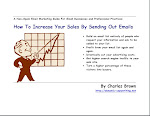Freelance Copywriter Secrets: Unleash The Awesome Power of Testimonials (Part 2)
Posted by Charles Brown at Tuesday, September 19, 2006freelance copywriter, copywriting tips, white papers, freelance commercial writer
This article is the second in a series of copywriting tips on how a freelance copywriter can use the power of testimonials to create persuasive ads, web content, direct mail and white papers.
In part one, Freelance Copywriter Secrets: Unleash the Awesome Power of Testimonials (Part 1),I explained that testimonials do four things: they give your copy the credibility that can only come from a third party endorsement, they transfer trust to you and your product, they provide evidence to support your claims and they tap into the persuasive power of social proof.
In this article we will look at how to solicit testimonials from your clients and customers.
- Communicate with your clients. Initiate feedback with people who are now, or have done business with you in the past. Do telephone surveys, or just informal “how things doing” follow up calls. Set up a blog and enable comments so people can ask questions and speak their minds. If feasible, make actual in person visits to their place of business. Send self-addressed comment cards, or place them on a counter top if customers come into your place of business.
The point here is to be in touch with your customers after you have done business with them. There are so many reasons to do this anyway, even without the hope of gathering complimentary testimonials. Customer feedback is like being handed a check.
Sometimes you will find people are not 100% happy with you. But this is not a negative. If there is a problem and you fix it, many people will find more wonderful things to say about you than if there had been no problem at all. - Take notes. Seldom will raw customer feedback be in a form you can use in an ad or as part of a white paper. But jot down what they are saying. If someone says something positive, just ask if you can write that down. After thanking the person, ask if you can use what he or she said in a brochure you are writing, or on an ad you are putting together. 99% of your customers will happily agree.
- Ask permission to edit You probably do not want to do this on the spot, but will find it preferable to call them back later. Do not attempt to reword their comments, just ask if you can shorten it or summarize their comments. Explain that you need a shorter version of the person’s words for your advertisement.
Marcia Yudkin, in her wonderful book, 6 Easy Steps to Free Publicity points out that such immortal quotes like, “war is hell,” or “nice guys finish last,” were originally spoken in longer and more round about ways. In both these two cases, and in many others, a hearer shortened and edited the original statement to make it pithier and, well, immortal. As long as your edited version of a client’s feedback does not go too far afield and retains the original essence of what was said, it will be OK with most people to rework their words, - Confirm the edited version. Do not use the edited version of a person’s words without their consent. Usually the briefer version will be just fine as long as you followed the rule above to keep it close to what was originally said and retain the original thought behind the comment.
And that is really all there is to it. One wonderful side benefit of doing all this will be an even stronger relationship with that customer.
In part three of this series, we will discuss what an excellent testimonial looks like. When you edit the feedback you get from a client, you will want to follow a certain formula that will make it more forceful and compelling. Good luck!
freelance copywriter, copywriting tips, white papers, freelance commercial writer
Subscribe to:
Post Comments (Atom)



0 comments:
Post a Comment